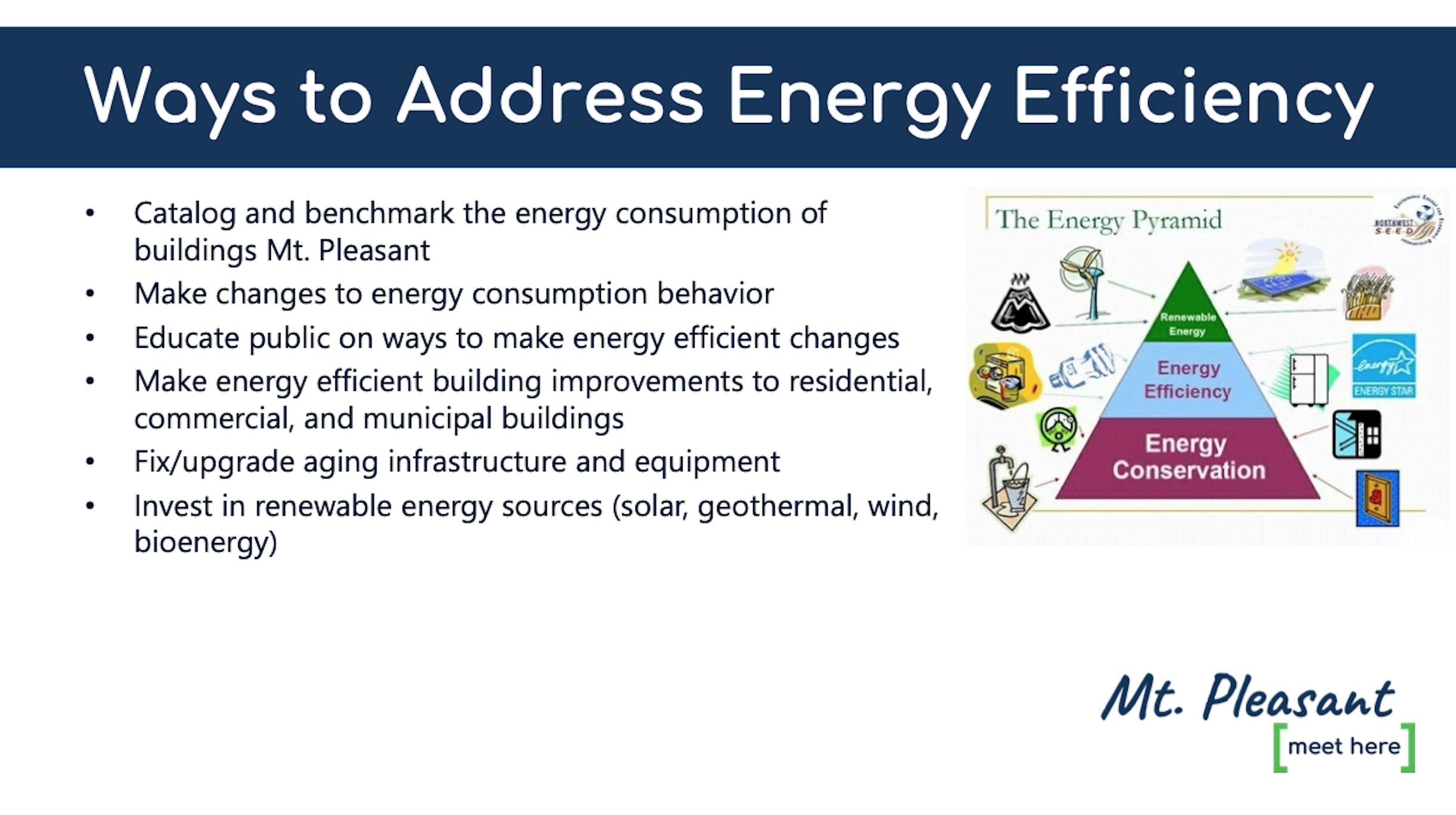“We have to face it” City commission hears energy efficiency report
At their last July 2023 meeting, the Mount Pleasant city commissioners heard updates on long-term goals and efficiency options
The Mount Pleasant City Commissioners started their Monday, July 24, meeting with a presentation from Central Michigan University student Mason Squillets-Peterson.
Squillets presented on actions the city can take to move towards energy efficiency. He was followed by City Manager Aaron Desentz, who updated the commissioners on this year’s goals and objectives.
Energy efficiency
“Through CMU, I do some energy efficiency here,” Squillets-Peterson, who is also an intern in the city Community Service Department, said. "I've been working on a bunch of different things on how we can make Mount Pleasant more energy efficient."
He listed a few reasons why Mount Pleasant needs to move in the direction of energy efficiency:
- Utility costs are increasing, state-wide: “Michigan is actually one of the worst for utility rates across all sectors, comercial, industrial and residential” Squillets-Peterson said. "Being more energy efficient will lower the bills people have to pay on their utilities each month."
- Better preparing for the threat of climate change, including drought, stress on the Great Lakes, extreme weather events, crop failure and loss of native plants and animals, he said.
- Sustainable and more efficient use of pre-existing infrastructure and technology;
- Supporting economic development from the local to national levels;
- And tapping into the younger generations' increasing support of efforts to combat climate change.
The main methods for change, Squillets-Peterson said, would be: conducting building audits; making personal changes to energy consumptions, such as turning off the lights when you leave a room; making building improvements; upgrading and fixing aging infrastructure and equipment; investing in renewable energy; and educating the public. It was education that he felt would be the easiest and most efficient form to helping make change.
“Providing information for the public to access is one of the best ways Mount Pleasant can help,” Squillets-Peterson said. “It can be overwhelming to sort through all the rebates, tax credits and programs that help pay for energy efficiency changes.
"If Mount Pleasant can figure out a way to provide all of this information in a way that is easy to read, easy to understand, easy to access ... that can put us on a good track to becoming more energy efficient," he said.
One option he suggested is the “Solarize” program. Squillets-Peterson said it works through the Great Lakes Renewable Energy Association to reduce the cost of solar installments with so-called “group buy discounts.”
“You just have a host and the GLREA will work with that group and a solar installer to get that discount applied,” Squillets-Peterson said.
When it comes to affordability, however, solar is not the most attainable, he noted.
“It’s crucial to remember that most people cannot afford these changes,” Squillets-Peterson said. He estimated that making the average household run on solar would cost anywhere from $15,000 to $30,000.
He recommended the city collaborate with different organizations to make the switch to solar more accessible. Some potential partners included: the Saginaw Chippewa Indian Tribe, CMU, Isabella County and commercial and residential property owners
Commissioner Boomer Wingard praised the presentation.
“The work you’re doing is incredibly vital,” Wingard said. “Young people want to live in a community that’s taking the climate crisis seriously.”
Commissioner and CMU professor Maureen Eke also appreciated the efforts to localize climate change.
“We do need information like this if we’re talking about sustainability and surviving in the future,” Eke said. “I agree that climate change is here, whether we have our heads in the sand like ostriches, or we’re looking up. We have to face it.”

Mid-year goals and objectives
City Manager Aaron Desentz gave a mid-year update on the city’s goals and objectives. Most are completed or in progress, he said, but changes had to be made to two of the objectives.
The first goal that was updated was: “(Looking to) explore options and develop a plan for long-term stormwater asset management,” Desentz said.
The first estimate the commissioners received -- issued at the end of 2021 -- was from a third-party consultant, who predicted estimating the storm sewer infrastructure would require $20 million over 20 years, he said.
After the city reevaluated the same measures, Desentz said the process was more likely to cost $10 million over the same 20 years.
"You can cut that number in half, instead of roughly $1 million per year, you have a price of about $500,00 per year," the manager said. In 2022, the city commission opted to reallocate a half-mil (roughly $1 per $1,000 in taxable value) tax to storm sewer infrastructure.
That generates about $250,000 per year, Desentz said; the remainder should be funded through "a number of different means" including street and capital improvement funds and grant dollars.
Another goal is becoming more difficult to achieve. That is to: “Provide quality employee experience from recruitment through retirement.”
Desentz explained the negative impacts the current economic downturn had on recruitment.
"REcruitment's an interesting venture right now," Desentz said said. “For every individual who is looking for a job, there are two available in this economy.”
Eight people left the city in the second quarter of 2023, he said. Of those, five were retirements and three left for, as Decent called them, "alternative careers."
The city commissioners meet at 7 p.m. every second and fourth Monday each month. To livestream their meetings, visit their YouTube channel. To participate via Zoom, use the link on the Mount Pleasant website.







